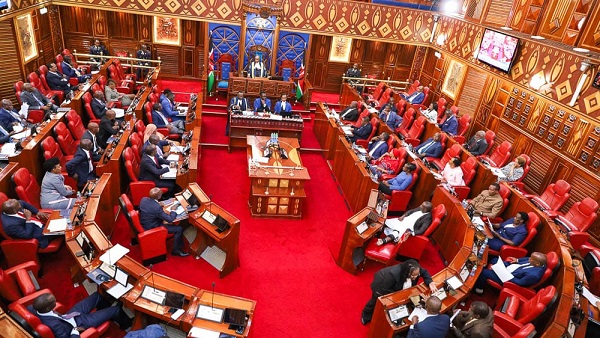Roles of The Senate
Senate’s overall function is to protect the interests of the counties and their governments. Article 96 of the Constitution provides that the Senate has a role in-
1. Law -making;
2. Determining allocation of national revenue among counties as per Article 217 of the Constitution and overseeing national revenue allocated to county governments; and
3. Considering and determining any resolution to impeach the President and Deputy President as per the provisions of Article 145 and 150(2) of the Constitution respectively.
A. Law-making
In exercising its legislative mandate, the Senate considers, debates and approves Bills.
Articles 110 and 256 of the Constitution provide that Bills that may originate from the Senate are -
(a) Bills concerning County Governments
Article 110 of the Constitution defines a Bill concerning County Governments as that which -
(i) contains provisions affecting the functions and powers of the County Governments as set out in the Fourth schedule;
(ii) relates to the election of members of a county assembly or a county executive; or
(iii) affects the finances of the County governments
The process of passing Bills in this category is guided by the provisions of Articles 111 through to 113 of the Constitution.
(b) Bills that propose amendments to the Constitution through Parliament as envisaged in Article 256 of the Constitution.
Other than Bills that originate from the Senate, the Senate considers Bills that -
(i) originate from the National Assembly but affect county governments;
(ii) propose to amend the Constitution under Articles 256 or 257 of the Constitution;
(iii) divide the national revenue between the National and County government i.e. the Division of Revenue Bill under Article 218(a) of the Constitution.
(iv) divide the national revenue allocated to the County level of government through the Division of Revenue Bill, amongst the county governments; i.e. the County Allocation of Revenue Bill under Article 218(b)of the Constitution.
B. Allocation of National Revenue
1. Division of revenue between the National and County Governments
Article 217(1) of the Constitution mandates the Senate to determine, by resolution, the basis for allocating among the counties the share of national revenue that is annually allocated to the county level of government. In determining the basis of revenue sharing under clause (1), the Senate must-
(a) Consider the provisions of Article 203(1)of the Constitution; i.e. the national interest, the public debt and other national obligations, the needs of the national government, the need to ensure counties perform their functions, fiscal capacity and efficiency of county governments, developmental and other needs of counties, economic disparities within and among the counties, affirmative action, economic optimization of each county, the desire for stable and predictable allocations of revenues and flexibility in responding to emergencies and other temporary needs;
(b) request and consider recommendations from the Commission on Revenue Allocation;
(c) consult the county governors, the Cabinet Secretary responsible for finance and any organisation of county governments; and
(d) invite the public, including professional bodies, to make submissions to it on the matter.
While considering the Division of Revenue Bill under Article 218 of the Constitution, the Senate ensures that the counties get their share of the revenues collected at the national level.
2. County Allocation of Revenue Bill
Immediately after the approval of the Division of Revenue Bill, the Senate is charged with considering, deliberating and voting on the County Allocation of Revenue Bill which divides revenue allocated to the county level of government amongst the counties using the formula developed by the Senate every five years as per the provisions of Article 217 of the Constitution.
3. Review of any Bills dealing with sharing of revenue or any financial matter concerning County Governments
The Senate also considers recommendations made by the Commission on Revenue Allocation regarding provisions of any Bill dealing with sharing of revenue or any financial matter concerning County Governments as per the provisions of Article 205 of the Constitution.
C. Impeachment
The Senate plays a pivotal role in the process of impeaching the following State officers-
1. The President
2. The Deputy President
3. The Speaker and Deputy Speaker of the Senate
4. The Governors.
1. President
The process of impeaching the President is outlined in Article 145 of the Constitution. The Senate is required to investigate allegations for impeachment of the President and resolve if they have been substantiated. The Senate may by resolution constitute a Special Committee of eleven Senators to investigate the allegations. If the Special Committee of the Senate finds that the allegations have been substantiated, then the Senate shall -
(i) accord the President an opportunity to be heard; and
(ii) vote on the impeachment charges
If at least two-thirds of all Senators vote to uphold any impeachment charge, the President ceases to hold office.
2. Deputy President
The process of impeaching the Deputy President is outlined in Article 150 of the Constitution. The Senate is required to investigate allegations for impeachment of the Deputy President and resolve if they have been substantiated. The Senate, by resolution, may appoint a Special Committee of eleven Senators to investigate the allegations. If the Special Committee of the Senate finds that the allegations have been substantiated then the Senate shall -
(i) accord the Deputy President an opportunity to be heard; and
(ii) vote on the impeachment charges.
If at least two-thirds of all Senators vote to uphold any impeachment charge, the Deputy President ceases to hold office.
3. Speaker and Deputy Speaker
Article 106(2)(c) gives the Senate the power to remove the Speaker or the Deputy Speaker from office if it passes a resolution supported by at least two-thirds of its members.
4. Governors
The process of impeaching the Governor is outlined in Article 181 of the Constitution and section 33 of the County Governments Act.
The Senate is required to investigate allegations for impeachment of the Governor and resolve if they have been substantiated. The Senate, by resolution, may appoint a Special Committee of eleven Senators to investigate the allegations. If the Special Committee of the Senate or the Senate sitting in Plenary finds that the allegations have been substantiated then the Senate shall -
(i) accord the Governor an opportunity to be heard; and
(ii) vote on the impeachment charges
If the Majority of Senators vote to uphold the impeachment charge, the Governor ceases to hold office.
If the vote to uphold the impeachment fails, then the Speaker of the Senate shall inform the Speaker of the concerned County Assembly.
A motion for removal of the Governor on the same charges may only be re-introduced in Senate on the expiry of three months from the date of the failed vote to uphold the impeachment.




















